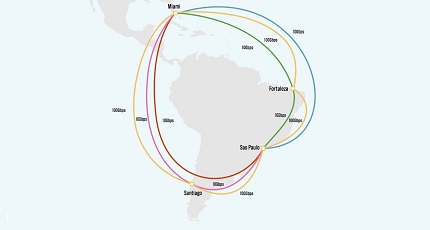 The Amlight consortium, which manages international connections between the United States and Latin America for teaching and research purposes, has announced the activation of new 100 Gb/s international connections in Fortaleza, Brazil, and Santiago, Chile. With these new links, researchers and students in both countries will have access to a new network infrastructure with ten times the bandwidth, to the benefit of international academic collaboration.
The Amlight consortium, which manages international connections between the United States and Latin America for teaching and research purposes, has announced the activation of new 100 Gb/s international connections in Fortaleza, Brazil, and Santiago, Chile. With these new links, researchers and students in both countries will have access to a new network infrastructure with ten times the bandwidth, to the benefit of international academic collaboration.
(Source: RNP, with information of Amlight) The new links are part of the AmLight Express and Protect (AmLight Exp) project, which receives resources from the National Science Foundation (NSF) and lasts for five years. The connections form a ring between Miami, Fortaleza, Sao Paulo, Santiago and again Miami, which makes the 100 Gb/ capacity also available in Santiago and Fortaleza. "This ring will soon be connected to future Ellalink (from Portugal) and SACS (from Angola) submarine cables, forming what should be called the South Atlantic Crossroads-SAX," said the RNP R&D director, Michael Stanton.
The high-performance connections will also serve the LSST (Large Synoptic Survey Telescope) project, a telescope that is under construction in Cerro Pachón, Chile. "The network will allow LSST data to travel to our data unit at the University of Illinois National Center for Supercomputing Applications (NCSA) in a matter of seconds. There, it will be processed in real-time for transient event alerts and annual releases of data containing billions of galaxies and stars", said the LSST project manager Jeffrey Kantor.
Researcher at the Florida International University (FIU), Julio Ibarra highlighted the geographically strategic positions of the two cities. "By adding Santiago and Fortaleza to the AmLight-ExP 100G ring, educational and research activities between the United States and South American countries will be able to rely on a more resilient and high-capacity network infrastructure", celebrated the researcher.
According to the project coordinator of the São Paulo academic network (ANSP), Luis Lopez, the reliability of high bandwidth is a challenge in a continental country like Brazil. "This great work of RNP with Brazil's electricity companies will allow us to extend a 100G backbone from the rainforest of the far north to the plains of the south. We need not to say how important this is for national and international scientific collaboration in the American continent", commented.
The AmLight consortium is a group of local, regional, and national academic and university networks: the Florida International University, RNP, ANSP, the academic networks of Chile (Reuna), Florida (FLR), the United States (Internet2), RedCLARA, which connects academic networks in Latin America, the Association of Universities for Research in Astronomy (AURA) and the telecom operator Telecom Italia Sparkle.



